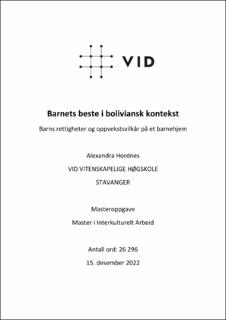| dc.contributor.author | Hordnes, Alexandra | |
| dc.date.accessioned | 2023-06-01T06:46:41Z | |
| dc.date.available | 2023-06-01T06:46:41Z | |
| dc.date.issued | 2022 | |
| dc.identifier.uri | https://hdl.handle.net/11250/3069558 | |
| dc.description.abstract | Denne masteroppgaven tar for seg hva som er forståelsen og praksisen av, samt vilkårene for barnets beste i Bolivia, spesielt barnehjemsbarn. Dette relateres til barnekonvensjonen og landets lover. Forskningen er bygget på kvalitativ metode bestående av intervjuer med ni med personer med kunnskap og erfaring om tema, og deltakende observasjon på et barnehjem i Bolivia og dens lokale og regionale kontekst. Samt basert på tidligere forskning både fra Bolivia, Sør- og Nord-Amerika og Europa. Funn viser at det trass betydelige juridiske forbedringer av bolivianske barns rettsikkerhet, er det store utfordringer. Et hovedfunn viser at det er vanskelig å få til kulturell endring (holdninger og praksis) når de økonomiske forholdene er så marginale og usikre. Det blir drøftet om barnets beste er å vokse opp med ysfunksjonelle foreldre eller på barnehjem, samt hvordan endringen fra institusjonalisering til støtte i hjemmet sees i Bolivia. Oppgaven konkluderer at med tanke på barnets beste i det bolivianske samfunnet har landet enda en vei å gå og fremdeles er kvinner og barn de som blir diskriminert i samfunnet. Holdninger arvet fra egen barndom samt generelt i samfunnet kan være til hinder for at rettigheter blir fulgt opp på en god måte, sammen med de begrensninger økonomien setter. Men det er viktig å ha mål som gir visjoner, håp, noe å strekke seg etter. | en_US |
| dc.description.abstract | This master’s thesis focuses on the understanding and practice of, as well as the conditions for, the Children’s Best in Bolivia, especially children in orphanage. This relates to The Convention on the Right of the Child and Bolivia’s laws. The thesis’s research is based on qualitative methods consisting of nine interviews with people with knowledge and experience about the subject, and observations at an orphanage in Bolivia and its local and regional context. It is also based on previous studies from Bolivia, South- and North America and Europe. Findings show that despite significant juridical improvement, to Bolivian children’s legal security, there remain significant challenges. A main finding shows that it is difficult to bring about cultural change (attitudes and practices) when the economic conditions are so marginal and uncertain. It is discussed whether it is in the child’s best interest to grow up with dysfunctional parents or in an orphanage, as well as how the change from institutionalization to support in the home is seen in Bolivia. The thesis concludes that in considering the best interest of the child in Bolivian society, the country still has a way to go, and women and children are still the ones who are discriminated against in
society. Attitudes learned from one’s own childhood and from in society in general can be an obstacle to rights being followed up in a good way, in addition to the restrictions imposed by the economy. But it is important to have a goal which give visions, hope and something to strive for. | en_US |
| dc.language.iso | nob | en_US |
| dc.rights | Attribution-NonCommercial-NoDerivatives 4.0 Internasjonal | * |
| dc.rights.uri | http://creativecommons.org/licenses/by-nc-nd/4.0/deed.no | * |
| dc.subject | Bolivia | en_US |
| dc.subject | oppvekstvilkår | en_US |
| dc.subject | sosioøkonomi | en_US |
| dc.subject | barnekonvensjon | en_US |
| dc.title | Barnets beste i boliviansk kontekst Barns rettigheter og oppvekstsvilkår på et barnehjem | en_US |
| dc.type | Master thesis | en_US |
| dc.description.version | publishedVersion | en_US |
| dc.source.pagenumber | 113 | en_US |

